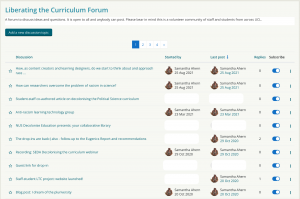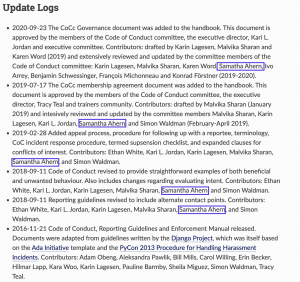Equality, Diversity and Inclusion
Throughout my career equality, diversity and inclusion have played an important role in the approach to my work. Some of this is from having seen childhood friends struggle due to unidentified learning difficulties whilst in formal education, the volunteer activities that I undertake and from a strong inbuilt sense of social justice.
In addition to the work I have undertaken with regards to digital accessibility, see Area 3 The Wider Context, I have been working on projects and self-development activities related to LGBTQ+, gender and de-colonising issues.
In addition to mandatory training on unconcious bias, I have attended the following workshops:
- UCL Arena Essentials: Trans Awareness: The Basics (June, 2019)
- Inclusive Language (August, 2021)

I am a member of both UCL’s womens Professional Services network UCL Astrea and the Women’s Higher Education Network (WHEN). When possible I attend the Liberating The Curriculum Forum meetups and share related articles and events in the associated Moodle course.
In 2018, I read both Rennie Eddo-Lodge’s Why I’m No Longer Talking to White People About Race and Kalwant Bhopal’s White Privilege. Reading Eddo-Lodge was a bit of a wake-up call. I think it is an important book that all educators, especially, those undertaking personal tutor roles should read. Because of this, I wrote a book review that was published by Nacada in December 2018. This has very much been the catalyst for my involvement in anti-racism and de-colonisation work.
Carpentries Code of Conduct Committee

From April 2018 to Spring 2021 I was a member of the Carpentries Code of Conduct Committee. During this time I was involved in the project to re-write the code of conduct, resolving a number of code of conduct related incidents, and a working group to discuss incidents outside of Carpentries spaces relating to those involved with the Carpentries. Additionally, I was involved in the second round interviews for a Lesson Infrastructure Technology Developer role.
As part of this role I was required to attend training on how to respond to incidents, but also on the language used and the choice of language. We were very keen for both the Code of Conduct itself and the comittee to be seen as positive and supportive of the Carpentries community and not negative or punitive.
Anti-racism in Learning Technology Working Group
In late October 2020 I responded to an email from Matt Lingard to the ALT mailing list about exploring anti-racism in learning technology and the formation of the informal Anti-racism in Learning Technology Working Group. I decided to join the group as there on-campus initiatives to de-colonise the curriculum but do not always think about the technology we are using the deliver that curriculum or the teams supporting said technologies.
My involvement has predominantly been within the Guidance for Content Creators sub-group, I chose to be part of this group as it most directly relates to the student experience of learning materials and my own experience of designing and creating online learning content. I have contributed to both of the sub-groups blog posts published to date:
- The Anti-Racism & Learning Technology Community of Practice: Guidance for Content Developers -Part 2 of 4
- A review of frameworks as a starting point for anti-racism content development
I am part of a small core membership for Guidance for Content Creators sub-group. After a summer break we are starting to plan our activities for the upcoming academic year.
Reflection
I am a white cis female and was what would be considered as a widening-particiaption student. I am from an area with very low Higher Ed participation, have a BTEC ONC as opposed to A levels and started my degree aged 20. There are some areas where I am very familiar and others where I am very much on a learning journey with regards to equality, diversity and inclusion.
Renni Eddo-Lodge’s book had quite a profound effect on my thinking. In that it woke me up to microagressions in everyday society and made me question my colour blindness. There are some things that I find uncomfortable, such as referring to my faculty colleague Pakhee by her name due to the racist connotations of its synonym. I am reflecting on these reactions and addressing them as appropriate.
What I have found particularly beneficial is collaborating with or receiving training from internal or external colleagues from a wide range of backgrounds and intersectionalities. This has helped broaden my understanding of issues but has also given me safe space to grapple with things and ask questions.
With regards to teaching and learning, I am more explicit in my considerations and will raise EDI related concerns in discussions. For example, the switch to online teaching due to the Covid pandemic highlighted the digital divide that exists, both within our institutions and nationally. When plans for online teaching or provisioning virtual compute as opposed to cluster room availability are discussed I raise issues related to the digital divide if they have not already been considered.
Outside of the work context I am working on projects to encourage women into a retain women in sport for both British Cycling, as a Breeze Champion, and British Canoeing as a #ShePaddles Club Champion. Through this work I have read reports and been involved in sessions about club cultures and the use of language and how this impacts on participation. I also use this learning to inform my thinking, how I interact with others and the teaching & learning materials that I produce.